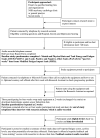Understanding patterns of fatigue in health and disease: protocol for an ecological momentary assessment study using digital technologies
- PMID: 38802273
- PMCID: PMC11131111
- DOI: 10.1136/bmjopen-2023-081416
Understanding patterns of fatigue in health and disease: protocol for an ecological momentary assessment study using digital technologies
Abstract
Introduction: Fatigue is prevalent across a wide range of medical conditions and can be debilitating and distressing. It is likely that fatigue is experienced differently according to the underlying aetiology, but this is poorly understood. Digital health technologies present a promising approach to give new insights into fatigue.The aim of this study is to use digital health technologies, real-time self-reports and qualitative interview data to investigate how fatigue is experienced over time in participants with myeloma, long COVID, heart failure and in controls without problematic fatigue. Objectives are to understand which sensed parameters add value to the characterisation of fatigue and to determine whether study processes are feasible, acceptable and scalable.
Methods and analysis: An ecological momentary assessment study will be carried out over 2 or 4 weeks (participant defined). Individuals with fatigue relating to myeloma (n=10), heart failure (n=10), long COVID (n=10) and controls without problematic fatigue or a study condition (n=10) will be recruited. ECG patches will measure heart rate variability, respiratory rate, body temperature, activity and posture. A wearable bracelet accompanied by environment beacons will measure physical activity, sleep and room location within the home. Self-reports of mental and physical fatigue will be collected via smartphone app four times daily and on-demand. Validated fatigue and affect questionnaires will be completed at baseline and at 2 weeks. End-of-study interviews will investigate experiences of fatigue and study participation. A feedback session will be offered to participants to discuss their data.Data will be analysed using multilevel modelling and machine learning. Interviews and feedback sessions will be analysed using content or thematic analyses.
Ethics and dissemination: This study was approved by the East of England-Cambridge East Research Ethics Committee (22/EE/0261). The results will be disseminated in peer-reviewed journals and at international conferences.
Trial registration number: NCT05622669.
Keywords: Fatigue; Heart failure; Information technology; Myeloma; Patient Reported Outcome Measures; Post-Acute COVID-19 Syndrome.
© Author(s) (or their employer(s)) 2024. Re-use permitted under CC BY. Published by BMJ.
Conflict of interest statement
Competing interests: DLH, professor of Digital Health at UCL, is also founder and CEO of Panoramic Digital Health, a company that is providing technology for this study. This potential conflict of interest is documented in accordance with UCL Disclosure of Conflict and Declaration of Interest Policy and has been reviewed by the Sponsor. None of the other collaborators have any conflicts to declare.
Figures
References
-
- Ramsenthaler C, Kane P, Gao W, et al. Prevalence of symptoms in patients with multiple myeloma: a systematic review and meta-analysis. Eur J 2016;97:416–29. Available: https://pubmed.ncbi.nlm.nih.gov/27528496/ - PubMed
-
- Prevalence of ongoing symptoms following Coronavirus (COVID-19) infection in the UK - office for National Statistics. n.d. Available: https://www.ons.gov.uk/peoplepopulationandcommunity/healthandsocialcare/...
-
- Swain MG. Fatigue in chronic disease. Clin Sci (Lond) 2000;99:1–8. - PubMed
Publication types
MeSH terms
Associated data
LinkOut - more resources
Full Text Sources
Medical

